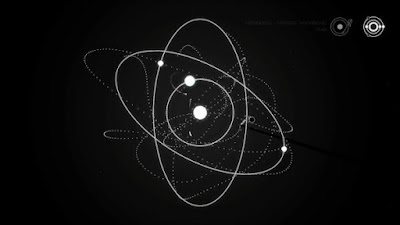Review by Jon Donnis
The game is pretty simple; each level starts with the sun in the middle, and you control a simple rocket (Voyager). With just one button, you control the thrust of the engine. Your job is to discover the planets that orbit around the sun.
The game itself contains barely any in-game instructions, and what I told you just now is probably more knowledge than what you will start playing with. But once you do start, there is a rather clever little game here. Now, I have to admit that at first, I assumed that you just press launch on the rocket once and then just watch it fly around the little galaxy, with gravity being the main propulsion. Once you have launched, I later figured out that you can actually keep the power going and even direct the thrust using your cursor, which in turn makes the whole experience much more fun and a little easier. As you fly around, battling the gravitational pull of the sun, you will eventually land on a planet. Once you do, it becomes visible in the galaxy, and you can then use that as a new launchpad. In the top right of the screen is a little map which indicates how many planets there are to discover and roughly how far away they are from the sun.
There is also, confusingly, a little record player next to that map, which for a while I thought was something to do with the gameplay. That record player will play some nice relaxing songs.
After you have found all of the planets in a level, you will move onto the next level. As you play, you will notice that you leave behind a track of the flight of your rocket, along with the orbit of the planets. This creates some pretty unique orbital artwork on the screen.
There are 8 levels to play, each one is a bit harder than the last. And you will get through them relatively quickly. Once you have completed them all, you unlock a star chart which allows you to choose to play any level again. If you do not complete the game, every time you start the game up again, you have to start from level 1 again. Once completed, you unlock an "Endless Mode," which I am not quite sure the point of. As you just play level one again, and once you find the planets, nothing happens; you just keep flying around. I assume endless mode just means the level doesn't finish, and you can just keep making patterns in the galaxy. It seems a bit pointless to me, and I would have preferred something a bit different, maybe a randomly generated level that keeps changing once planets are found.
The Good:
Simple, clear graphics.
A great original chillout soundtrack.
A lovely idea for a game that will entertain you.
Small download size too and will run on any laptop/PC.
The Bad:
No tutorial.
No controls menu.
A lack of instruction does hurt things, but then I guess the game is supposed to be minimalist, but sometimes you do need a bit of instruction.
Needs more levels, or a random level generator.
Overall:
I like the game, once you figure things out it is fun, and there is some skill involved to progress. It can get a bit frustrating at time when you know roughly where a planet is, but you keep missing it, that in turn takes away the relaxing element of the game. But it does mean the game is a challenge and I like that. I score Voyager on PC (Steam) a decent 8/10. The experience might by short, but for less than a pound, it is worth it.
Out now on Steam at













No comments:
Post a Comment